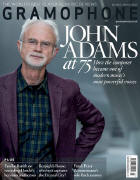Texte paru dans: / Appeared in: |
|
 |
Outil de traduction |
|
Reviewer:
Mark Seow We begin high up in the atmosphere with a chord that shimmers into being like the opening of Ralph Vaughan Williams’s Fantasia on a Theme by Thomas Tallis. But it lasts for much longer, seemingly resistant to gravity. The strings are sad even when the harmonies are major. Then Joyce DiDonato sings a wordless siren, a part traditionally played by trumpet. It’s an eerie alternative: the sound of a future in which ambulances have lungs and sing towards the cries for help they seek to heal. Il Pomo d’Oro under the direction of Maxim Emelyanychev bring us a spectacularly bleak version of Ives’s The Unanswered Question. The dissonant clamour of winds is so far fronted in the mix that they bite, and the simultaneous tempo planes are made into something timbral and spatial, too.
There’s a lovely flow from the Ives through Rachel Portman’s The First
Morning of the World into Mahler, which is then gloriously punctuated by the
thrum of Baroque guitar and pattering of percussion in Marini’s ‘Con le stelle
in Ciel che mai’. But then I’m left feeling a bit stranded by the side of the
road. The juncture between the Marini and Myslive∂ek, for these ears, is
particularly uncomfortable. Indeed, Myslive∂ek’s aria from Adamo ed Eva
is so exuberantly chirpy that surely it does not belong here. Of course, it’s
difficult to argue with DiDonato’s crystalline coloratura, and in many ways the
thrilling accompaniment is Il Pomo d’Oro at their best, too. The individual
performances are sensational. But as a journey in which the chasms of centuries
between the Baroque and the late Romantic are reduced to a skip-hop over the
Bächle of Freiburg, the outer thirds of the album accomplish this far more
successfully. I do not quite believe that Myslive∂ek’s aria unfurls out of the
blue and silver oxygen of Ives’s Creation chord. |
|




